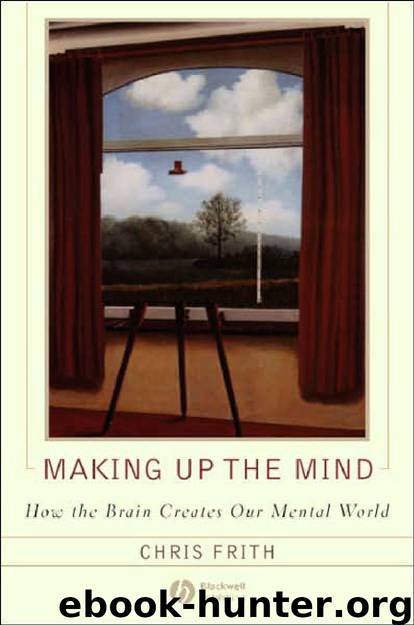Making up the mind by Chris Frith

Author:Chris Frith
Language: eng
Format: mobi
Tags: Non-fiction, Popular science
Published: 2011-10-23T02:32:18+00:00
Our Perception of the World Is a Fantasy
115
message would arrive at the other end of the line and there would be no way of knowing that an error had occurred.
But if messages contain bits of information that are redundant, then errors can be detected and the original message can be recreated. For example, we could send the same message twice. The second message is completely redundant, but if the two messages that arrive are different then we know that errors have occurred. Of course, we still do not know which is the correct message. If we send the same message three times, and if two of the three messages agree, then we can use this as a rule for deciding which is the correct message.
I remember the days when neither computers nor even electronic calculators were available. Complex mathematical calculations had to be done by hand, and it was almost inevitable that errors would be made.
The standard procedure to guard against this was to repeat the calculation three times. If the same answer came out twice, this was probably correct since it was unlikely that exactly the same error would be made in each calculation.
Our brain has to deal with exactly the same problem. The messages about the outside world that come to us through our eyes and ears are noisy and full of errors, so our brain is not sure what is “real” and what is an “error.” To avoid this, our brain takes full advantage of redundancy.
When we are talking to someone face to face we are not just listening to what they say – we are also closely watching the way their lips move. By putting these two kinds of information together, our brain gets a better idea of the original message that was sent. We are not usually aware of using the lip movements in this way, but when we watch a foreign film that has been dubbed into English (or an English film that has been poorly sound edited), we are instantly aware that there is something wrong because the lip movements do not match the sounds.
By using information theory, telephone lines were made more efficient at transmitting messages.7 But information theory had an impact far beyond the profits of telephone companies. The definition of information in terms of simple physical states (such as the on or off state of an electronic switch) meant that it was now possible to store information in 7
While redundancy can be used to overcome the problem of noise and errors in a telephone line, there is always a cost since more characters have to be transmitted. Using information theory, it was possible to find optimal ways of using redundancy with minimal cost. An example would be the cyclical redundancy checking used by the modems that connect us to the internet.
Download
This site does not store any files on its server. We only index and link to content provided by other sites. Please contact the content providers to delete copyright contents if any and email us, we'll remove relevant links or contents immediately.
The Art of Thinking Clearly by Rolf Dobelli(10489)
Mindhunter: Inside the FBI's Elite Serial Crime Unit by John E. Douglas & Mark Olshaker(9344)
Change Your Questions, Change Your Life by Marilee Adams(7783)
Nudge - Improving Decisions about Health, Wealth, and Happiness by Thaler Sunstein(7709)
Mastermind: How to Think Like Sherlock Holmes by Maria Konnikova(7347)
The Power of Now: A Guide to Spiritual Enlightenment by Eckhart Tolle(5784)
Men In Love by Nancy Friday(5240)
Altered Sensations by David Pantalony(5105)
Factfulness: Ten Reasons We're Wrong About the World – and Why Things Are Better Than You Think by Hans Rosling(4742)
The Confidence Code by Katty Kay(4262)
Thinking in Bets by Annie Duke(4227)
Man and His Symbols by Carl Gustav Jung(4137)
The Worm at the Core by Sheldon Solomon(3487)
Why Buddhism is True by Robert Wright(3454)
Liar's Poker by Michael Lewis(3450)
Three Women by Lisa Taddeo(3434)
The Inner Life of Animals by Peter Wohlleben(3319)
Descartes' Error by Antonio Damasio(3279)
How Music Works by David Byrne(3272)
